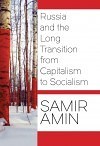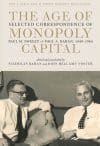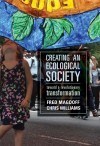
David Wilson: “Renegotiating NAFTA Will Serve the Rich—Like It Always Has”
David L. Wilson, author, with Jane Guskin, of The Politics of Immigration: Questions and Answers (2nd Edition), looks at NAFTA, and why it’s back in the news | more…

David L. Wilson, author, with Jane Guskin, of The Politics of Immigration: Questions and Answers (2nd Edition), looks at NAFTA, and why it’s back in the news | more…

Is a world based on equitable needs, empathy, and sustainable economics possible? Fred Magdoff and Chris Williams, who co-wrote Creating an Ecological Society: Toward a Revolutionary Transformation, believe so—but such a world, they argue, would require the end of capitalism. In this Truthout interview, Magdoff—professor emeritus of plant and soil science at the University of Vermont—shares his vision with Mark Karlin. | more…

Samir Amin’s Russia and the Long Transition from Capitalism to Socialism is a collection of essays written between 1990 and 2015 on Soviet and Russian history…. ¶ At first glance, the title might appear to be backwards, as the socialist Soviet Union no longer exists and the capitalist Russian Federation has been deemed to be its successor on the world stage. However, it is from this juncture that Amin asks the reader to look towards the future as a way to analyse the present in comparison with the past, rather than looking back at the past to better understand the present and the possible future. In short, the author’s aim is to juxtapose the future of communism (as a higher mode of production) against the present in comparison with Russia’s past | more…

In or around Baltimore Tuesday, August 22? Come to Red Emma’s Bookstore Coffeehouse and hear Howard Ryan talk about his book, Educational Justice: Teaching and Organizing Against the Corporate Juggernaut | more…

Historian Gerald Horne, author of over thirty books, including the forthcoming The Apocalypse of Settler Colonialism: The Roots of Slavery, White Supremacy, and Capitalism in Seventeenth-Century North America and the Caribbean, talks to Chris Steele on students’ need for the histories of resistance | more…

David L. Wilson, author, with Jane Guskin, of the second edition of The Politics of Immigration: Questions and Answers talks to Kansas City’s Heartland Radio Forum about Workers Across Borders, and Workers Who Cross Borders | more…

Paul A. Baran and Paul M. Sweezy were two of the leading Marxist economists of the twentieth century. Their seminal work, Monopoly Capital: An Essay on the American Economic and Social Order, published in 1966, two years after Baran’s death, was in many respects the culmination of fifteen years of correspondence between the two, from 1949 to 1964. Their surviving correspondence consists of some one thousand letters. Not since Marx and Engels carried on their epistolary correspondence has there has been a collection of letters offering such a detailed look at the making of a prescient critique of political economy—and at the historical conditions in which that critique was formed. | more…

Gerald Horne, historian and author of the upcoming The Apocalypse of Settler Colonialism: The Roots of Slavery, White Supremacy, and Capitalism in Seventeenth-Century North America and the Caribbean, talks to Nellie Bailey on the Black Agenda Report | more…

‘In order to replace capitalism with an ecological society we need a revolution.’ That modest sentence is how Fred Magdoff and Chris Williams begin the last chapter of their new book. Although the chapter is the end of the book, it is also an opening to a new direction, a new movement. It is also the essence of the entire text. Capitalism is the reason our biosphere is collapsing and the only way humanity and the rest of earth’s species can survive is by ending capitalism…. | more…

Thinking of going to Missouri? Think again. Gerald Horne, author of several books on the history of racism and injustice in the Americas, including the forthcoming The Apocalypse of Settler Colonialism: The Roots of Slavery, White Supremacy, and Capitalism in Seventeenth-Century North America and the Caribbean, talks to Sharmini Peries of The Real News Network about the NAACP’s first statewide travel advisory, for the state of Missouri. ¶ “Not only may we be returning to the bad old days of Jim Crow and US apartheid, but we may be going beyond that to the era of 1857 Dred Scott…” | more…

Ian Angus, author of Facing the Anthropocene: Fossil Capitalism and the Crisis of the Earth System and, more recently, A Redder Shade of Green: Intersections of Science and Socialism, speaks at the Marxism 2017 Festival in central London, July 8, 2017. (Questions and answers follow.) | more…

Historian Gerald Horne, author of over 30 books, including the forthcoming “The Apocalypse of Settler Colonialism: The Roots of Slavery, White Supremacy, and Capitalism in Seventeenth-Century North America and the Caribbean,” talks to veteran news anchor and analyst, Utrice Leid about some of the major trouble spots in the world today and their connections to U.S. globalist agendas. | more…

A long-standing critique of the writings of Marx and Engels has been their supposed lack of concern for the environmental damage caused by capitalism. Worse, even as they envisaged and fought for a world of human freedom, their conception of socialism showed a comprehensive disregard for how humans interact with nature. ¶ Marx has been viewed as Promethean: as soon as the proletariat had taken over the factories, its job would be simply to build more factories, in ever-expanding spheres of production. Given that the regimes claiming the mantle of Marx in the twentieth century took exactly that pathway, it’s not hard to understand why this charge gained such credence. ¶ However, that position has become wholly untenable thanks to two decades of scholarship by John Bellamy Foster and Paul Burkett…. | more…